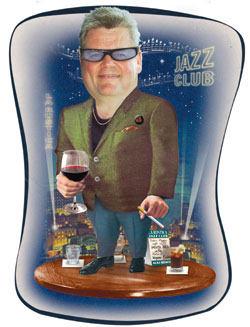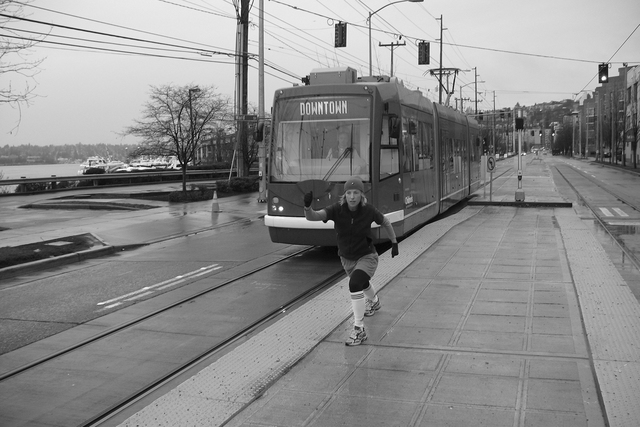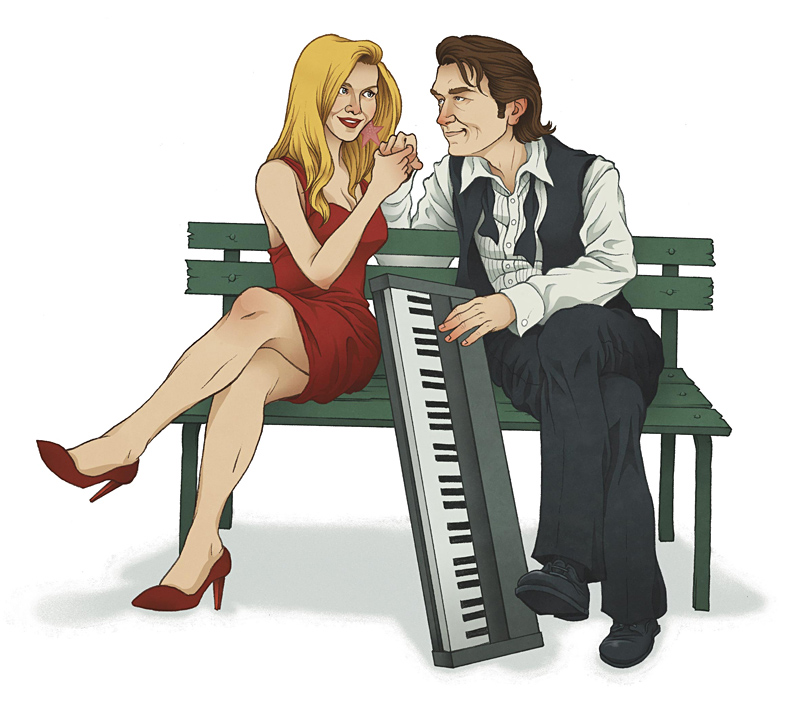Set on the residential backside of beach drive around the bend from Alki’s bustling shores, La Rustica is not held hostage to the American Graffiti cruising culture that permeates West Seattle’s public waterfront. Simply appointed and inconspicuous, La Rustica greets diners with a patriarchal maître d’ in a maroon tracksuit and maybe a dozen white-linen-covered tables. With Puget Sound mere yards away and a menu chockablock with fresh-catch items, the Italian bistro accomplishes its presumed goal of transferring patrons’ palates and minds to the Mediterranean Sea.
La Rustica is not officially open to the public on Monday nights, supposedly to give its culinary brain trust a chance to reconfigure plates to sate the fickle buds of the restaurant’s small but faithful clientele (lines outside the small bistro’s front door on weekends are all but guaranteed). Here, there is no more loyal patron than West Seattle resident and Seattle Mayor Greg Nickels, the former “Mr. Nice” who has belied his big-softy reputation by instituting a regime of Chicago-style hardball politics that has left a timid City Council cowed.
In Chicago—which happens to be the mayor’s birthplace—when the mayor wants a table, the mayor gets a table. And for the past three months, Nickels has wanted all of La Rustica’s tables—on Monday night, no less—diverting taxpayer funds previously earmarked for the Mayor’s Office of Film and Music to instead nurture a stealth, underground music scene at the restaurant that Nickels hopes will spawn the city’s 21st-century answer to grunge and put to rest the notion that his administration is hostile to any and all kinds of after-hours carousing.
Wayman Tisdale squeezes his 6-foot-9-inch, 280-pound frame into a wooden chair toward the back of La Rustica’s tiny kitchen, tuning his bass guitar. A former star power forward at the University of Oklahoma and in the NBA, where he socked away enough loot to stay fat and happy without ever having to lift another finger, Tisdale has nonetheless forged a remarkably successful second career as a jazz musician. Not just any kind of jazz—smooth jazz, an offshoot of the real thing that has been derided by purists as being sanitized to the point of elevator music or dental lobby fare.
As he rehearses a riff from his chart- topping single, “Hot Ice . . . On the Rocks,” the normally affable Tisdale tears into his genre’s critics.
“I don’t know about you,” says Tisdale, clad in an olive green suit, Filipino wedding blouse, bolo tie, and white cross-stitch Capezio loafers, “but I tend to like music that makes me feel as though I’m sitting on a yacht off the coast of Santa Barbara, sipping chardonnay with a blond fortysomething divorcée who looks a lot like Linda Evans. What sort of cat doesn’t want to hit that?”
As a sous-chef prepares a rich chocolate mousse for the invitation-only collection of guests assembled at the tables outside, Tisdale is joined in the kitchen by the New Age singer Basia, whose Time and Tide topped both adult contemporary and smooth-jazz charts in the late ’80s. Like Tisdale, Basia is grateful for the oasis the latter genre has provided her career.
“Smooth-jazz fans are really the most accepting people I’ve ever encountered,” says the middle-aged chanteuse, before launching into an impromptu scat attack. “Bo-zee-bo-shum-boop-bop-zam!”
In La Rustica’s dimly lit dining room, Nickels and his wife, Sharon, sit at a 10-top assembled on a pedestal above all other tables near the restaurant’s lone unisex lavatory. Here, Nickels is feasting on prosciutto and mushroom pasta, his wine of choice a private reserve ’68 Frijon Rouge from the boutique label Hearthstone Cellars, compliments of the maître d’.
The mayor’s personal garb is fetching, if a bit out of character: charcoal gray turtleneck, tweed blazer, black cowboy boots with silver heels, and the odd yet alluring combination of tartan pants and a big brass belt. Those close to Nickels say that, as with Al Gore, there are really two Gregs: Greg the politician and Greg the fun-lovin’ guy. This is that guy.
As the mayor cracks wise about rumors that his predecessor, Paul Schell, was an adult incontinent, two chairs down, Nickels’ go-to guy, Deputy Mayor Tim Ceis, scrolls through his BlackBerry, attempting to calculate how big a chunk of Nickels’ secret jazz budget—known to mayoral staffers and close associates as “The Quiet Storm”—tonight’s festivities will eat up.
“Tisdale’s basically performing pro bono,” explains Ceis. “He’s rich enough, as is, and knows this is really all about showing young musicians what they can do with their lives. But Basia’s costing us a fucking fortune. I’d be lying if I said I didn’t feel a little guilty about this one, but the mayor’s a huge fan.”
Around the room sits a slew of civic power brokers, among them: Norm and Constance Rice, Jan Drago, Jean Godden, Shaun Alexander, Dale Chihuly, Dow Constantine, Ed Murray, Downtown Freddy Brown, Maria Cantwell, George Griffin, Tom Skerritt, Bill Russell, David Brewster, Ken Bunting, Bob Watt, Frank Blethen, Slick Watts, David McCumber, Edgar Martinez, Lorenzo Romar, Blair Butterworth, Kathy Casey, Dawn Mason, Adam Kline, Sally Clark, Yuniesky Betancourt, Ray Allen, Jeff Ament, Peter Buck, Richie Sexson, Quincy Jones, and Dwight Pelz.
Once all the mousse has left the kitchen, Tisdale and Basia stroll out to a small stage area wedged between the service bar and Nickels’ table. The mayor rises to introduce them.
“I want to thank everyone for joining me here at La Rustica to support Seattle’s blossoming smooth-jazz scene,” he says. “It’s especially heartening to me that we’ve got a table of young jazz musicians here from Garfield and Cleveland high schools. Nothing makes me happier than young people who’ve never experienced the transcendental power of this music.
“Only a few of you know that my wife and I insisted that our wedding DJ play at least six tracks from Manhattan Transfer’s debut album, Chilling Con Carne,” the mayor continues. “I really believe smooth jazz is the music that will set the city’s nightclubs ablaze—without waking the neighbors.
“While they’re not Seattleites themselves,” he adds, “Basia and Wayman really embody what I see as the future of Seattle music. We were hanging out in the kitchen earlier talking about scented candles, our favorite Thomas Kincaid portraits, and the best day spas in Palm Desert. That’s called aspiration, folks. That’s what this city should be about. So without further ado, Basia and Wayman Tis-da-bizzy-sha-pop-bitty-bop!”
As is well known in civic lore, Greg Nickels dropped out of college, never to return, at the age of 19 to serve as a legislative assistant to then–City Council member Norm Rice (who would go on to become the city’s first black mayor). While his peers spent their 20s awash in water bongs and Zeppelin anthems, the major artistic influence of Nickels’ young adulthood was smooth jazz, the default soundtrack at the infinite number of politically correct fund-raisers and cocktail-hour hobnobs he attended.
Then and in later years, Nickels feasted aurally on a steady diet of smooth-jazz chart-toppers such as Boney James, Spyro Gyra, Fourplay, the Rippingtons, Al Jarreau, Aaron Neville, Anita Baker, Michael McDonald, Christopher Cross, Herbie Hancock, Jeffrey Osbourne, Gerald Levert, Lionel Richie, John Secada, Ray Parker Jr., Harry Connick Jr., Tuck & Patti, Sade, Chris Botti, and of course, Seattle’s own Kenny G.
But the seeds of Nickels’ smooth-jazz obsession were actually sown near the Capitol Hill home of his youth (the Nickels family moved here from Chicago when Greg was 6) at a pharmacy owned by City Council member George Benson. Nearly every day, after classes let out up the hill at Seattle Preparatory Academy, young Greg and his two closest friends, Phil Tronquet and Cletoris “Clete” Wilson—one of only a handful of black students to attend the tony Jesuit high school in the civil rights era—would race down the hill to Benson’s pharmacy, where they loaded up on wax packs of baseball cards and bottles of Sunkist orange soda.
There, Benson would regale the boys with tales of civic life—most notably, Seattle’s jazzy Jackson Street past. Benson had a turntable near the register and would often play records from that bygone era. While the boys appreciated the lessons they learned from the wily pharmacist-politician, none of the records proved accessible enough, until Benson put on a record by a jazz guitarist with a familiar name: George Benson.
“When he put that platter on, Greg asked old man Benson why he never told us that he played guitar,” recalls Wilson, over a glass of ginger ale and bourbon at the Kingfish on 19th Avenue East. “Benson says, ‘That ain’t me, Greg. I might be George Benson, but you’re listening to the George Benson.'”
Council member Benson went on to explain that guitarist Benson had generated controversy in the jazz community by emphasizing melody over improvisation in his compositions—the very formula that would soon be distilled into what is now commonly known as smooth jazz.
Young Nickels was hooked, and began buying all of Benson’s records. He also took a stab at the jazz game himself, learning xylophone and forming a short-lived trio called Gregor & the Mendels, whose zenith came when the band snared third place at the Prep talent show during Nickels’ senior year.
Benson the council member would later be singled out for his political mentorship in all of Nickels’ various runs for public office. Wilson, now a 55-year-old architect who lives on Candy Cane Lane in Ravenna, says that since the day George Benson placed George Benson on the pharmacy phonograph, politician and musician have essentially melded into one composite character in Nickels’ psyche.
“You get a couple glasses of port in the mayor and he starts going on and on about how George Benson serenaded him at his wedding, convincing himself and everyone around him that this was the jazz musician,” laughs Wilson. “Well, actually, it was only councilman Benson grabbing the DJ’s microphone and singing ‘Just the Two of Us’ over the actual recording.”
Despite setting up a special city- supported task force of nightclub owners and supporting a permanent home for the all-ages Vera Project during his tenure, 2006 has been a year in which Nickels has come under fire from the nocturnal community for being a lapdog for Scrooge-like Belltown condominium owners and teetotaling NIMBYs.
The main legislative tools wielded to earn this reputation have been the mayor’s proposed nightlife ordinance and Community Good Neighbor Agreements that club owners are being forced to sign before (or even after) they are permitted to open their doors. The city Department of Planning and Development has also been accused of liberally—and perhaps illegally—interpreting zoning regulations to selectively quash hot spots in neighborhoods like Phinney Ridge and Squire Park. These tactics have been widely condemned as being overzealous chunks of nightlife kryptonite, put forth by a hypocritical mayor who’s made past campaign assurances that he wants a “24-hour city” that is an active supporter of live music.
In mid-July, Nickels assembled a small team of trusted staffers—among them Ceis, Jordan Royer, and the city’s Film and Music Office director, James Keblas—to chart a proactive strategy to “calm the storm,” as one City Hall staffer says, on condition of anonymity.
“Five of us are squeezed into a back booth at West 5, of all places, at, like, 1 in the morning,” says the staffer, referring to the popular Junction lounge. “Bear in mind, Nickels never stays out much past 8. Anyhow, we’re all sitting there with tired looks on our faces. All of the sudden, the mayor says, ‘Calm the storm, quiet storm—that’s it!’ None of us had a fucking clue what he was talking about, until he mentioned Billy Ocean.”
According to Clete Wilson, the Trinidad-born, British-bred Ocean, whose real name is Leslie Charles, has long been one of Nickels’ favorite musicians. A luminary in “Quiet Storm,” a genre named after a Smokey Robinson song of the same title, Ocean has always been considered by Nickels to be an innovator. The mayor has gotten into heated arguments with friends and family over whether Ocean singles such as “Loverboy,” “Caribbean Queen,” “License to Chill,” “Love Zone,” and “Get Out of My Dreams (Get Into My Car)” qualify for dual entry into the smooth-jazz realm—with Nickels inevitably arguing the pro side.
Nickels met Ocean after one of the singer’s concerts at a casino in San Sebastian, Spain, where Nickels was vacationing with his wife in the summer of ’85, two years before he would be elected to his first term as a King County Council member. After a moonlight walk on the beach, Ocean invited the Nickelses to fly up to his sprawling estate in Suffolk. The couple accepted, and despite resisting Ocean’s overtures to engage in a three-way hot-tub tryst, have remained friendly with the soulful crooner since.
So Nickels decamped from West 5 to his family’s West Seattle bungalow, where he composed an e-mail, offering Ocean airfare, expenses, and $20,000 cash to play a top-secret gig in the dining room at La Rustica. Ocean wrote back, saying he was flattered at the invitation, but would not accept unless the city granted him a special permit to ride a white Shetland pony on the sands of Alki (a complicated deal that included detailing a police officer for a full 24 hours to scoop the horse’s crap). The mayor acquiesced, and began extending invitations to well-placed acquaintances under the guise of a charity fund-raiser.
Mega-producer Quincy Jones was among the people in the audience when Ocean took the stage on Monday, Aug. 7.
“Jaws dropped, man,” says Jones, a Garfield High grad. “Of course, Billy and I go way back. But the look on Ron Sims’ face—it was priceless. You could tell people were impressed with the mayor’s passion for getting kids involved in smooth jazz and his vision for a ‘thousand points of smooth’ across the city. By the time Billy sang ‘get in the backseat, baby,’ everyone in the crowd was already along for the ride.”
Between Ocean and the Tisdale-Basia twin bill, the mayor has booked a luminary to play every Monday at little La Rustica. While Barry Manilow sent his regrets on account of his ongoing “Music and Passion” gig at the Vegas Hilton, and local boy Kenny G’s technical demands proved too unwieldy, the roster of smooth-jazz all-stars to grace La Rustica’s makeshift stage over the past three months has nonetheless been incredibly impressive.
Aug. 14: Dionne Warwick, accompanied on piano by Diana Krall. Aug. 21: Herbie Hancock and Norah Jones. Aug. 28: Burt Bacharach and Christopher Cross. Sept. 11: Lionel Richie, joined around midnight by Kenny Rogers, fresh off a gig earlier that evening at the Puyallup Fair. Sept. 18: Spyro Gyra. Oct. 2: a Gerald Levert–Keith Sweat twin bill dubbed “Chilly Sweat.” Oct. 16: Chris Botti and Anita Baker. Oct. 23: Natalie Cole.
Virtually all of these performers have received fees commensurate with Ocean’s. But on Nov. 6, Nickels is planning a special get-out-the-vote concert at La Rustica featuring Sting and Sade, who will perform as a duo under the moniker S2. Collectively, S2 is expected to cost city taxpayers a quarter-million dollars, not including expenses.
So how is the city paying for this? By sucking the Film and Music budget dry, says the anonymous City Hall staffer.
“The city has completely abandoned any desire to lure big-ticket film projects to town—to the point where you might as well strike ‘Film’ from the department’s name,” says the staffer. “And [agency head] Keblas used to have a staff of three and an office with a view of Mount Rainier. Now it’s just him, he has to get executive approval to purchase so much as toilet paper, and they’ve got him bunked up in a cubicle at Meadowbrook Community Center with the recreation director.”
Still, the staffer views the planned S2 gig as more than a bit gratuitous.
“I truly believe the mayor has the best intentions with his Quiet Storm,” says the staffer. “But the Sting thing is ludicrous. It’s as though Nickels thinks he’s a big- shot concert promoter instead of mayor. Remember, this is a guy who ran on fixing potholes and making the stoplights change on time.”
Boyhood friend Wilson disagrees.
“The Quiet Storm is just the sort of big-vision thing I always expected Greg to roll out at some point,” says Wilson. “The only thing I’m surprised about is that it took him this long.”
Others see Nickels’ Quiet Storm as purely political.
“He’s gotten pretty banged up over his perceived attacks on the city’s nightlife,” says Hunter Shingleton, a professor of political science at Central Washington University. “He wants to find a way to counteract that impression without pissing off his core constituency, which is white, affluent, middle-aged homeowners who go to bed before 10. So to me, aggressively fostering an underground smooth-jazz scene seems like a canny example of Clinton-esque triangulation.”
And yet, when one sees the mayor’s face light up like a Christmas tree as Basia launches into a 30-second scat scale or Tisdale nails a riff from the Euge Groove hit “Chillaxin” on his bass, it’s impossible to deny that this is a venture fueled in some part by passion. Then there’s a subcomponent of the La Rustica project that Ceis calls “Storm Front”: At every star-studded performance, a lone table is set aside for student musicians ranging in age from junior high to junior college.
While many of these young patrons are already promising musicians in their own right, Nickels’ Alki sessions have exposed them to another level of the smooth-jazz game. To wit, Seattle Central Community College freshman Tyler Jurevicius blew out a tight tenor sax solo during Gerald Levert’s “Casanova” at his Oct. 2 gig, while on Oct. 23, a bespectacled 300-pound Franklin High crooner named Bobby “BoBo” Pitts sang the Nat King Cole part on “Unforgettable” when daughter Natalie’s hologram projector malfunctioned. These youngsters, says Ceis, are sowing the seeds for an imminent indie smooth-jazz explosion, the scale of which the city has not witnessed since the halcyon days of grunge.
All of which makes Wilson, who’s sat in on a handful of the Alki sessions, proud of the grown-up version of the chubby, carefree kid who used to live for Topps trading cards and George Benson.
“All year long, I’ve been reading headlines about how Greg is anti-nightlife, about how Greg is anti-music—thinking all along: If only they knew what I know,” says Wilson, polishing off his third bourbon at the Kingfish. “Now everyone will realize just what a smooth cat they’ve put in charge of this city.”








